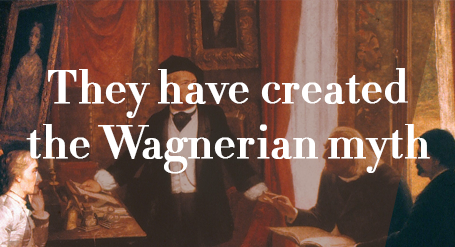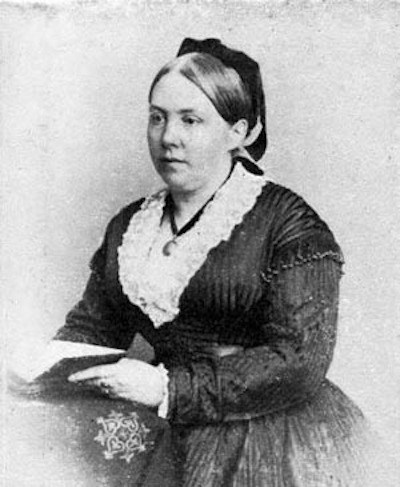
If Wagner was the cultural and musical chronicler of his time, if he remained a revolutionary activist, he had also gone into the act of police, and if he was finally his master of Bayreuth celebrated as the one of the major artist of his At the time, the illustrious composer did not live before a man made of chair and blood, animated by passions, with a sometimes violent, sometimes facetious, and sometimes tender character.
LAUSSOT Jessie
(born in 1829 – died in 1905)
and “The Jessie Laussot affair”
The only photograph of Mrs Jessie Laussot apparently available and that we obtained is hardly indicative of who was the young nineteen-year-old woman who inspired (a few decades before this photograph was taken!) Richard Wagner one of the most impassioned love affairs that the composer knew. And yet!
This idyll was one of the most “troubling” episodes of Wagner’s personal and romantic life that still retains today some measure of mystery, while revealing certain traits of the composer’s… least glorious characteristics: “the Jessie Laussot affair” has certainly not delivered all its secrets… !
It all began in Dresden in 1848: Wagner at the time was starting to enjoy success (Rienzi’s triumph, then more moderate successes of The Flying Dutchmanand Tannhäuser) and some fame.
And it was precisely to attend one of Tannhäuser‘s performances on the stage of the Semperoper in Dresden that the very young Jessie Taylor, madly passionate about music, and especially about this young German composer’s music who was starting to get talked about in private salons, expressly made the journey from Bordeaux. Fascinated by the work, our young music lover followed the progression of the performance with the most feverish passion, a copy of the score she had studied in clear detail on her knees. At the end of the performance, Jessie expressed the desire to have her score signed by the Master himself, through Karl Ritter, Wagner’s companion since their early years and who since became his personal secretary.
The meeting between the young woman and the composer marked him deeply: “the young lady expressed her admiration for me in terms I had never heard before” he later wrote in “My Life” (Mein Leben).
After this furtive (but still memorable) meeting, Wagner resumed the course of his career and life with his wife Minna, and as for Jessie… she took the train that was to bring her back to Bordeaux.
For Wagner, alas, the months that followed were the beginning of a long and winding road. For his stance with the revolutionary movements of 1849, the composer was sought, forbidden to stay in the Kingdom of Saxony, exiled from his homeland, and hunted down wherever he was. From Switzerland where he took refuge for a moment, Wagner went to Paris without a penny or a valid passport, hoping to be shielded from prosecution. As for Minna, she preferred to stay in Dresden, claiming that things would improve with time and that she would speak in favour of her husband’s return to grace. But we know that the young Wagners were going through recurring crises; Minna therefore undoubtedly found there a way to pause the quarrels that opposed her wholly and daily to her unbearable husband.
Having heard of the woes overwhelming her favourite composer, Jessie – who had in the meantime become Mrs Laussot (her mother, a rich heiress by the name of Mrs Taylor, had arranged her daughter’s marriage with a young wine merchant, Eugène Laussot, who would have been none other than… her former lover) asked Wagner to come “take refuge” in Bordeaux, where certainly no one would bother him.
Wagner accepted the invitation, left Paris after being subjected with full force to the triumph of a performance of The Prophet by his rival Meyerbeer, and arrived in Bordeaux on 16 March, 1850.
To his friends Theodor Uhlig in Dresden and Wilhelm Baumgartner in Zürich, he gave the following postal address: “Mrs Jessie Laussot, 26 Cours du XXX Juillet“. For his wife Minna he left the same address, but “… ℅ Mr Eugene Laussot”!
Initially invited for a short visit, the composer ended up staying three weeks in Bordeaux and quickly, the Laussot household in Bordeaux became the theatre of a very strange situation. Jessie, who was extremely sensitive, had a hard time hiding her feelings for the composer for whom she felt a delicious mix of artistic admiration and romantic emotion. Aged twenty-one at the time, she was a cultivated woman who spoke German without an accent and played the piano. Wagner read to her his draft librettos for his future operas Siegfried and Wieland der Schmied (Wieland the Smith), that she particularly admired.
Presiding over the table during meals, the mother chaired with severity, imposing on her daughter her every wishes and mixing with her son-in-law and former lover with a certain ambiguity. The young Laussot did not see for his part that the august guest responded with a certain coolness to the attraction of his young wife.
As if the situation was not complex (and even unhealthy) enough, Julie Ritter, Karl’s wife, who paid Wagner an annual pension of 1,000 thalers in hopes of seeing the composer perfect her husband in the art of composition, became friends with Mrs Taylor!
The two women decided by mutual agreement to give a united support to the composer who was subsequently to benefit from… 3.000 thalers, both far away from suspecting that Wagner considered on the one hand Ritter as a dreadful incompetent, and lived on the other hand the early days of a love affair with the young Jessie!
And to add to the “strangeness” of the situation, Minna, from Dresden, kept sending missives to Wagner, suspecting an imminent catastrophe in Bordeaux!
With Jessie, Wagner found every afternoon when they went together for a walk, comfort, admiration and love. The idyll quickly transformed into the most ardent passion for these two beings who were unhappily married. Without thinking for a moment that the support would be cut off if he were to pursue his plans, the composer put together the wildest plans with Jessie. Counting on the pension of 3,000 thalers, he planned to run away with his belle, far from everything and everyone: Malta, Greece… the Middle East!
It was during a return trip to Paris of only a few days of the composer – sure of the impending concretization of his most mindless dreams – that the bomb exploded.
In a letter full of recriminations dated 16 April, Wagner informed his wife Minna that he wanted to split with her. Meanwhile, Jessie confided her anxieties or plans to her mother, who in turn informed her son-in-law. Minna, for her part, threatened her husband with a scandal. And the husband, as was done at the time, threatened to… bring out the guns! Never did Richard Wagner, who, moreover, had to live discreetly as he was sought by the French police, find himself at this moment of his existence in a more complex, unhealthy and inextricable situation!
However, unconscious, Wagner wrote to his rival, to suggest a “friendly” encounter. Could Laussot retain by force a woman who no longer wanted him? In May, he rushed to Bordeaux. Arriving at 9 at the “Hôtel des Quatre Sœurs” on 18 May, 1850 – on the same street as the Laussots, Cours du XXX Juillet, he waited in vain for the husband: the couple had left town. Instead, he received a summons from the local police superintendent, who had been informed that Wagner’s status was not in order and gave him two days to leave town. Two days, that was the period the police superintendent, otherwise a fervent admirer of the composer, gave him to leave town. Wagner dropped off a long letter for Jessie. But in June of the same year, however, having undoubtedly returned to her senses (or under the constraint and threat of her mother and her husband?), the young woman informed the composer that she no longer wanted to see him again.
Wagner never wrote a “Laussotlieder” nor the Wieland Schmied. The love story had abruptly stopped. Wagner went to live in Zürich… and live another idyll, with a woman named… Mathilde Wesendonck…
For her part, Jessie Laussot ended up leaving her husband in 1853. She moved to Florence, where she married the writer Karl Hillenbrand, a friend of Nietzsche, who had been a columnist for the newspaper La Gironde in Bordeaux. She was however to see Wagner again in 1876 – some say in Florence, some in Bayreuth. Then to die, in 1905, twenty-two years after the passing of her first love.
“L’Hôtel des Quatre Sœurs” in Bordeaux now has a portrait on the wall commemorating the composer’s very short stay in May 1850. And his grandson, Wolfgang Wagner, even lived there for some time, in 1997.
NC
If you wish to share further information about this article, please feel free to contact us !
